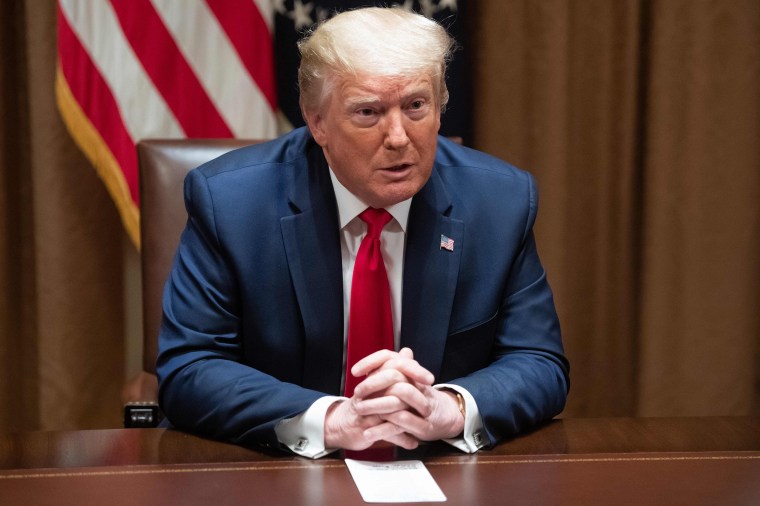WASHINGTON — For years now, Republicans on Capitol Hill have looked to the White House for cues as to which direction the party was going on issues from health care to immigration to gun control, rarely getting ahead of President Donald Trump.
That has not been the case with police reform.
While the White House scrambles to generate proposals to address police misconduct and discrimination in the aftermath of the killing of George Floyd, Senate Republicans have pushed ahead this week, announcing work on their own legislation addressing the issue.
Senate Majority Leader Mitch McConnell of Kentucky on Tuesday tapped South Carolina Sen. Tim Scott — the only black Republican in the Senate — to lead the efforts.
“We’re still wrestling with America’s original sin. We try to get better, but every now and then it’s perfectly clear we’re a long way from the finish line,” McConnell, whose great-great-grandfathers owned slaves, told reporters.
Scott met with his GOP colleagues Tuesday to discuss his proposal, which is expected to leverage federal funding to promote the use of body cameras and de-escalation training, as well as improve the reporting process of police-involved shootings to a federal database.
“Well, we are on a separate track from the White House,” Scott told reporters Tuesday.
Later Tuesday, White House chief of staff Mark Meadows, senior adviser Jared Kushner and adviser Ja’Ron Smith came to the Capitol for a last-minute meeting with Scott to discuss police reform.
"It's a work in progress. It was a real good conversation," Meadows told reporters after the meeting, adding that "we're hoping for something sooner than later."
Rep. Jim Jordan, R-Ohio, one of Trump’s strongest allies on the Hill, also said this week he would also be releasing his own police reform plan.
Some lawmakers have been left flat-footed in the aftermath of Floyd’s death, as public opinion has dramatically shifted in favor of Black Lives Matter and more voters say they are concerned about Floyd’s death rather than the protests that followed it.
While Trump has done little to unify the country after Floyd’s death on May 25, instead tweeting out conspiracy theories about protesters and threatening to unleash “vicious dogs" and "ominous weapons" on demonstrators, some Senate Republicans have offered a notably different tone.
Sen. Mitt Romney of Utah marched in a Black Lives Matter protest in Washington on Sunday. Sen. John Cornyn of Texas said he recognized there were “systemic problems” in policing that needed to be addressed and that the arrests of the officers involved in Floyd’s death did not solve “the larger problems that exist in our society.” Sen. John Thune of South Dakota said he hoped Republicans could propose ideas that “suggest that we hear what people are saying and we want to do better at this.”
Even Sen. Tom Cotton of Arkansas, who wrote an op-ed in The New York Times arguing that the U.S. military should be used against protesters, said Tuesday during the Republican meeting that “young black men have a very different experience with law enforcement in this nation” and the party needed to be “sensitive” to that.
Still, any movement by Senate Republicans on policing and discrimination could prove futile without the support from the president, who has a record of undercutting his own party’s plans.
Trump is expected to address police reform Thursday while visiting with law enforcement officers and black faith leaders in Dallas. But some in the White House cautioned that the president might not provide a clear idea of precisely what sort of reforms he supports until next week.
“As it stands currently, the president has spent the last 10 days quietly and diligently working on proposals to address the issues that the protesters raised across the country,” White House press secretary Kayleigh McEnany said at a briefing Wednesday. “That body of work, I’m told, is reaching its final edits, and we hope to produce it for you in the coming days. I can’t promise you it's tomorrow, but in the coming days we look to deliver that.”
It is unclear how much change Trump is willing to consider. The president has privately stressed to aides the importance of keeping the law enforcement community on board with whatever he puts forward while simultaneously addressing public outrage over police misconduct, according to a senior administration official.
That balancing act may prove to be too difficult, as has been the case for the president with other attempts at policy reform.
Last fall, Trump abandoned gun reform legislation he had been working on with Republicans after some advisers and allies close to him raised concerns that it could splinter his political coalition ahead of his re-election.
Any legislation would also need support from the Democratic-controlled House. The president and House Speaker Nancy Pelosi, D-Calif, have not spoken since his impeachment earlier this year.
Democrats on Monday announced a sweeping police reform bill that would ban chokeholds and no-knock warrants in drug cases and would roll back qualified immunity, a legal provision that gives police officers and other public officials broad immunity from civil lawsuits.
The White House has said any effort to limit law enforcement’s qualified immunity was a “nonstarter,” while some Senate Republicans have suggested some willingness to consider the idea.
“I'm actually thinking seriously about the qualified immunity,” said Sen. Mike Braun of Indiana. “Most in our conference don't want to go that far, but I'm really going out to see if I can get a few others interested in looking at that as well because I think that'd be the one thing, that we show them, in our conference, we mean business. You never know, this might be a watershed moment.”




